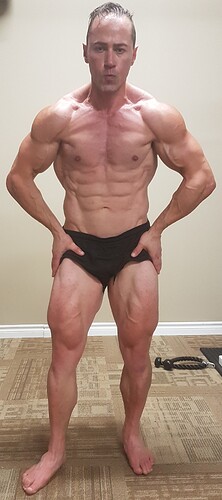Hello Jordan,
For the past 4 years I’ve typically had a waist circumference (WC) of 38-39” (photo 1) weighing about 210 lbs.
I’ve lost bodyfat in the last 3 months and I’m now 35.5” WC, 199.5 lbs (photos 2 and 3).
I’m 43 years old, 5’8”.
My question is: Should I either: 1. Maintain or lower my 35.5” WC; or
2. Slowly gain weight, say up to 37” WC, to support gaining strength? I have no diseases and my blood pressure was 110/64 two years ago when I had more fat at 207 lbs. (The public blood pressure machines have been turned off since Covid.)
I currently:
-
Have maintained a weight within 1 lb of 199.5 lbs, with a WC about 35.5”, for 5 weeks.
-
I added 500 calories a day for the last 2 weeks. (I felt “hungry,” whether real or psychological or habit, and I was concerned about adherence). I’m now eating 3,700 calories with 51% carbs, 36% protein and 13% fat. A typical day of eating: https://www.myfitnesspal.com/food/di…ate=2021-08-16
-
3,700 is a lot of calories but I could easily eat 5,000 calories or more. I’m trying to feel as satiated as possible and I find protein to be the most satiating and fats to be a bit calorie dense or they trigger overeating.
-
Weight train 4x a week and cycle 100km or more a week.
I got a Rogue rack 5 weeks ago after not having one for 8 months. I’m still regaining strength while maintaining my current weight.
I’d like to compete in powerlifting. The IPL weight class that might be best for me is 90kg or 198 lbs. (The IPL has meets in my city whereas IPF meets are over 4 hours away. Also the IPF classes of 83kg and 93kg might be a bit low and high respectively for my current weight of 199.5 lbs.)
I think that I should:
-
Maintain or lower my current WC of 35.5” for at least a year. Benefits: 1) Solidify habit of maintaining a healthy body composition, 2) Potentially be more competitive for powerlifting, 3) Enjoy the aesthetics of having less bodyfat.
-
Try to increase strength without gaining any fat for a year. I’d like to think that I have a reasonably high potential to gain strength without excessive fat gain because: 1) I’m returning from a layoff, 2) I can do better programming, and 3) I can better manage recovery with sleep hygiene, nutrition, stress management, etc.
In short, I think that I should see what I can do over a year with: 1. Maintaining my recently lowered WC, and
2. Not nocebo myself into thinking that I can’t get stronger without gaining a lot of fat. Those are my current thoughts based on what I think I’ve learned from you and the Barbell Medicine team. I’m grateful for any advice and I’d appreciate any suggestions, thank you!


